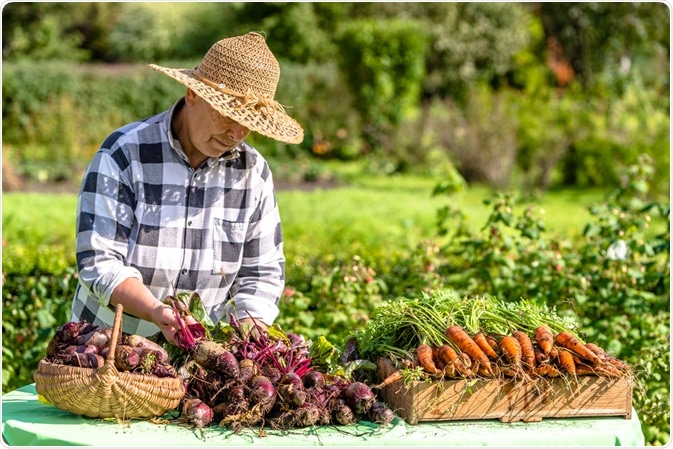Organic farming is an ecological socially just and healthy alternative to traditional agricultural systems. It was developed as a response to conventional farming practices which, over the decades, have increasingly embraced the use of chemicals and unethical practices to grow their crops and raise and slaughter their livestock and care for their dairy animals.

Image Credit: alicja neumiler/Shutterstock.com
The demand for organic produce continues to rise, which is expected to grow at a CAGR of 9% between 2019 and 2024. This is mainly being driven by the public’s increasing awareness of the health benefits of consuming organic produce, which is outweighing the drawback of its higher price-tag.
While there are obvious environmental benefits to organic farming, the industry is facing some key challenges. Below we discuss the key principles of the practice, along with its benefits, and challenges.
The principles of organic farming
First, organic farmers minimize external inputs and outputs (such as waste products) to maintain a closed system that is self-sustaining and recycles the products of its processes.
Second, protecting soil’s fertility and structure is a major component of organic farming, with organic farmers encouraging the proliferation of bacteria, fungi, and earthworms in the soil as this adds vital nutrients into the soil, benefiting the nutritional value of the crops.
The avoidance of using any practices that cause pollution or contribute to emissions is another key principle of organic farming. This means that the polluting waste produced by livestock is recycled as fertilizer, produce is aimed to be sold locally to reduce the burning of fossil fuels associated with its transportation, and as a rule, emission emitting processes are limited as much as possible.
There is a key focus on producing food that is higher in quality than that produced by traditional farming. Animals are not fed antibiotics, and crops are grown without the use of synthetic pesticides.
GM technology is prohibited from use in organic farming, leaving farmers to utilize techniques such as traditional rotations and scientific organic breeding techniques instead.
Finally, there is a strong focus on animal welfare in organic farming. Standards have been established that are very strict which outlines the conditions in which animals can be kept and how they can be slaughtered.
Stress and illness can often plague traditionally farming livestock because of the poor conditions they are kept in, organic farmers take measures to ensure that the health and welfare of their animals is a priority.
Organic farming benefits
Organic farming is more ethical, as discussed, it limits the detrimental impact on the health and wellbeing of the animals it raises. It gives respect back to nature that traditional farming has omitted to give it. As consumers grow and increasing sense of responsibility, this benefit has become a key driver for the increasing demand for organic food.
The better quality, chemical-free produce made available by organic farming doesn’t pose the potential threats to health that produce grown via traditional farming does. People eating organic food are consuming less unnatural products that have been linked with several diseases and illnesses, such as cancer.
Recent studies have revealed that organic farmers enjoy better mental health than traditional farmers. In the UK, farmers have particularly high rates of suicide and depression, although a recent study showed that those who have organic farms are somewhat protected from this. It is theorized that the conditions of organic farms which is closer to that of farms of the past that are full of wildlife and people working together that benefits the mental health of those working there.
Finally, organic farming protects the environment from the detrimental impacts related to traditional farming, as a result, it contributes less to global warming.
Organic farming challenges
While organic produce has a higher market value, farmers are finding it hard to see profits. Because they don’t use fertilizers on their crops or administer antibiotics to their animals, the yields of organic farms can be less than those of traditional farms.
These lower production levels combined with the higher costs associated with organic farming can leave organic farmers to struggle to make a profit even with premium retail prices and the subsidies they receive for their contribution to protecting the environment and wildlife.
There is a learning curve involved with switching to organic farming, this has resulted in farmers being reluctant to embrace the practice which now means that there are not enough organic farms in the US to keep up with the growing demand for organic food.
While traditional farmers can hire people to spray their crops with fertilizer, and pesticides to ensure a successful crop, organic farmers have to figure the process out themselves. This can result in low crop yields while farmers learn the processes involved in ensuring successful crop growth.
Finally, in some regions, organic farmers are struggling to get the necessary organic certifications. Organic farmers in Africa, for example, face high costs and corruption when trying to get certified, and the government offers little help to facilitate this process.
For this reason, only 2% of farms in Africa are considered organic, which is much lower than the 7% average seen around the world.
The struggle to get certified is preventing organic produce from being traded, which is adding to the problem that there are not enough organic farms to meet the increasing demand for organic food.
Further Reading